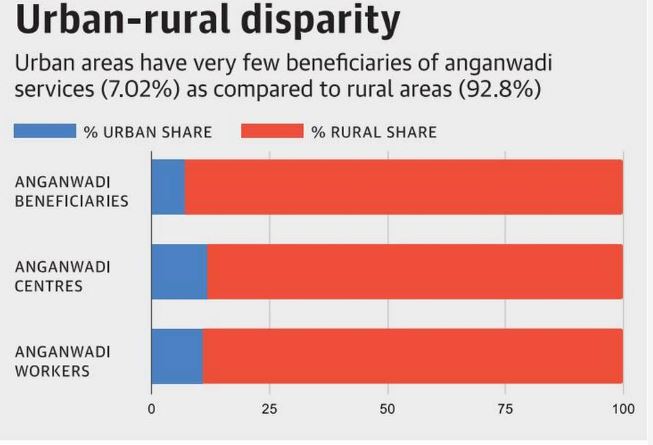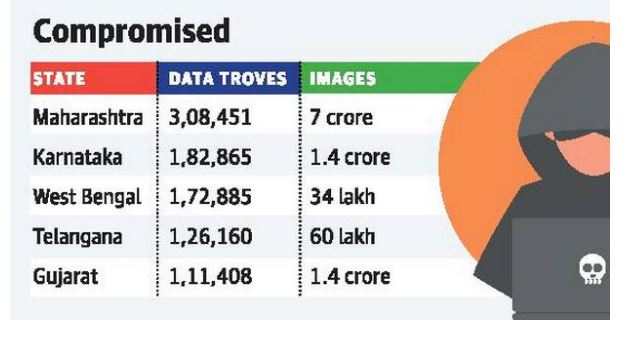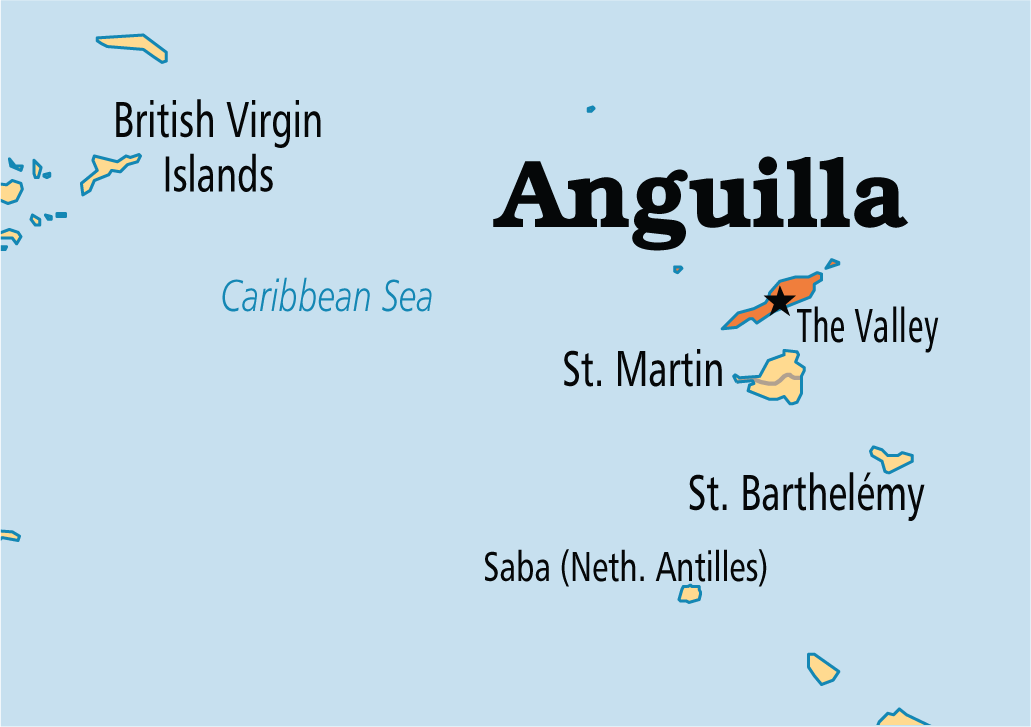Lack of Anganwadis in Urban Areas
Why in News
Recently, the government’s response to a Right to Information (RTI) query has revealed that for every 100 anganwadi beneficiaries in the country, only 7 are in urban areas.
- The minuscule presence of beneficiaries is due to lack of Anganwadi centres in urban areas.
- This shows poor coverage by the Integrated Child Development Scheme (ICDS) in urban areas.
Anganwadi Centres
- Anganwadis or day-care centres are set up under the centrally sponsored Integrated Child Development Services (ICDS) scheme.

- The scheme is being implemented by the Ministry of Women and Child Development.
- Anganwadi centres provide a package of six services: supplementary nutrition, pre-school non-formal education, immunisation, nutrition and health education, as well as referral services.
- Aim: To reduce infant mortality and child malnutrition.
- Beneficiaries: Children in the age group of zero to six years, and pregnant women and lactating mothers.
Current Scenario
- Number of beneficiaries
- Out of 7.95 crore beneficiaries of the Anganwadi scheme in the country as on September 30, 2019, only 55 lakh were registered at urban anganwadis.
- Less number of anganwadi centres in urban areas
- There are 13.79 lakh anganwadis operational across the country, out of which 9.31 lakh centres are linked to the government’s web-enabled data entry system called Rapid Reporting System.
- Of that linked anganwadis, 1.09 lakh centres are in urban areas and the remaining 8.22 lakh are in rural areas of the country.
- Scope for coverage by the scheme
- National Nutrition Survey 2016-18 found that 35% of children under five were stunted and 17% were wasted.
- It also found that 22% of children in the age group of 5-9 years were stunted and 23% were thin for their age.
- Urban areas specific: Children in urban areas showed two to three times higher prevalence of obesity as compared to their peers in rural areas.
- National Nutrition Survey 2016-18 found that 35% of children under five were stunted and 17% were wasted.
- Latest Step Taken
- The NITI Aayog has been working on a draft paper to strengthen the ICDS programme in urban areas, keeping in mind challenges such as migration, population density and the long commute involved for workers and beneficiaries.
Anti-Dumping Duty on PTA Abolished
Why in News
The government has abolished anti-dumping duty on a chemical called Purified Terephthalic Acid (PTA). The same was mentioned by the Finance Minister in her Budget speech.
- PTA is an important raw material which is used in making various products, including polyester fabrics.
- PTA makes up for around 70-80% of a polyester product and is, therefore, important to those involved in the manufacture of man-made fabrics or their components.
- The latest move has come after persistent demand from the manufacturing and textile industry to source PTA at an affordable rate.
Meaning and Purpose of Anti Dumping Measures
- Dumping is said to occur when the goods are exported by a country to another country at a price lower than the price it normally charges in its own home market. This is an unfair trade practice which can have a distortive effect on international trade.
- Anti-dumping is a measure to rectify the situation arising out of the dumping of goods and its trade distortive effect.
- Many countries impose stiff duties (known as anti-dumping duties) on products they believe are being dumped in their national market, undercutting local businesses and markets.
- The use of anti-dumping measure as an instrument of fair competition is permitted by the World Trade Organisation (WTO).
Background
- The anti-dumping duty on PTA was imposed after domestic manufacturers approached the Directorate General of Trade Remedies (DGTR) in October 2013.
- DGTR imposed anti-dumping duties on PTA imported from South Korea, Thailand, China, Indonesia, Taiwan, Iran and Malaysia between 2014 and 2016.
- However, companies using PTA to manufacture polyester products claimed that the move left them with limited domestic suppliers of PTA.
- The companies alleged that the cost of PTA became more expensive domestically, which made their own products pricier and less attractive for their domestic and international buyers.
Directorate General of Trade Remedies
- It is the apex national authority under the Ministry of Commerce and Industry for administering all trade remedial measures including anti-dumping, countervailing duties and safeguard measures.
- It provides trade defence support to the domestic industry and exporters in dealing with increasing instances of trade remedy investigations instituted against them by other countries.
Similar Case of Mono Ethylene Glycol
- Mono Ethylene Glycol (MEG) is another such raw material used in the manufacturing of polyester and is under anti-dumping duty investigation initiated by the DGTR, recently.
- The manufacturers of MEG have argued that top MEG exporters like Kuwait, Saudi Arabia, Singapore and the United Arab Emirates (UAE) have been dumping the product because of which the domestic industry is suffering.
- Textile companies have approached DGTR against the imposition of anti-dumping duties on MEG as the step would lead to the same situation that developed after imposing anti-dumping duty on PTA.
Medical Data Leaks
Why in News
A German cybersecurity firm, Greenbone Sustainable Resilience has published its second report related to medical data leaks.
- According to the report, medical details of over 120 million Indian patients have been leaked and made freely available on the internet.
- The first report was published in October 2019, which had observed a widespread data leak of a massive number of records, including images of CT scans, X-rays, MRIs and even pictures of the patients.
- After the first report was published, the number of medical data leaks bearing the patients’ information increased from 6,27,000 to 1.01 million and that of the images of patients’ details rose from 105 million to 121 million.
Key Findings of India
- Categorisation of Countries
- The report classified countries in the “good”, “bad” and “ugly” categories based on the action taken by their governments after the first report was made public.
- India ranks second in the “ugly” category, after the U.S.
- State-wise Analysis
- Maharashtra reported the maximum medical data leaks followed by Karnataka, and West Bengal.
- Reasons
- Generally, medical details are stored on Picture Archiving and Communications System (PACS) servers which are linked to the public internet without any protection. Thus, the lack of security makes them easily accessible to malicious elements.
- PACS is a medical imaging technology which provides economical storage and convenient access to images from multiple modalities.
- Generally, medical details are stored on Picture Archiving and Communications System (PACS) servers which are linked to the public internet without any protection. Thus, the lack of security makes them easily accessible to malicious elements.
- Concerns
- Doctors or hospitals are ethically, legally and morally bound to maintain the confidentiality of medical records. The report indicates the moral irresponsibility on the part of medical practitioners.
- There are possibilities of fake identities being created using the leaked medical details. The fake identities can be misused in any possible ways.
Data Protection in India
- The Information Technology Act, 2000 amended in 2008 contains provisions for the protection of electronic data.
- The Information Technology (Reasonable Security Practices and Sensitive Personal Data) Rules were framed under Section 43A of IT Act which sets out a procedure for corporate entities which collects, possess and collects personal data.
- According to the Supreme Court in the Puttaswamy judgement (2017), the right to privacy is a fundamental right and it is necessary to protect personal data as an essential facet of informational privacy.
- Recently, the Indian Parliament tabled the Personal Data Protection (PDP) Bill, 2019 which would be India’s first attempt to domestically legislate on the issue of data protection. The Bill categorises certain personal data as sensitive personal data. This includes financial data, biometric data, health data, caste, religious or political beliefs.
DefExpo 2020
Why in News
DefExpo, a flagship biennial event of the Ministry of Defence, is being held for the first time in Lucknow (Uttar Pradesh) from 5th to 9th February 2020.
- This is the 11th edition of DefExpo - a mega defence exhibition. DefExpo is one of the largest events of its kind.
- The 10th edition of the event was held at Chennai (Tamil Nadu) in 2018.
- The main theme of the DefExpo India- 2020 is ‘India: The Emerging Defence Manufacturing Hub’ and the focus will be on ‘Digital Transformation of Defence’.
- DefExpo-2020 promises to bring new technologies, technological solutions, where defence manufacturing companies from India and abroad showcase their products and services in defence arena, on a single platform. This provides Indian defence industry an opportunity to promote its export potential.
- Defence Expo 2020 will showcase the comprehensive spectrum of India’s aerospace, defence and security interests.
- The fifth India Russia Military Industry Conference will be held on the sidelines of the event.
- The Conference primarily aims at addressing issues related to life-cycle support and maintenance of major Russian-origin equipment/ platforms such as SU-30 MKI aircraft, Mi-17 Helicopters, MiG-29K aircraft, INS Vikramaditya and T-90 tanks.
Conference on Capacity Building Reforms and iGOT
Why in News
Recently, the Department of Personnel and Training (DoPT) had organised a conference to explore the training requirements of Government officers at various levels of hierarchy.
- DoPT is the nodal department for the training of Government functionaries and is primarily responsible for formulating policies with regard to capacity building and strengthening the Human resources within the government.
Key Points
- During the conference, it has been decided to widen the scope and coverage of the initiative of Integrated Government Online Training (iGOT) programme which was launched in December 2018.
- iGOT aims to augment the existing training mechanism with online module-based training.
- It also aims to make training inputs available to Government officers on-sight and on-flexi-time basis.
- A consultation paper on ‘Approach to Strategy and Implementation of iGOT 2.0’ was also released.
- iGOT 2.0 will play a major role in achieving a comprehensive and systematic capacity building initiative for the civil servants in the light of the current challenges like lack of political will, lack of communication and coherence, implementation issues, etc.
- The conference also intended to familiarize the Cadre Controlling Authorities (CCAs) and Central Training Institutes (CTIs) with the new digital capacity-building framework to deliver online content.
World Heritage Site Certificate to Jaipur
Why in News
The Chief Minister of Rajasthan will dedicate the United Nations Educational, Scientific and Cultural Organisation (UNESCO) world heritage site certificate for Jaipur to the people on 5th February, 2020.
- The walled city of Jaipur, famous for its grid plan-based architecture and buildings constructed with the pink facade, was declared a world heritage site by UNESCO in July 2019.
- A brochure on “Intangible Heritage Promotion Project” would also be released.
Intangible Heritage Promotion Project
- It is signed between the Tourism Department of Rajasthan and UNESCO and aims at developing 10 new cultural tourism destinations in the State.
- It would be implemented during the next three years at a cost of ₹7.50 crore.
- It will directly benefit about 1,500 artists in the districts such as Jodhpur, Barmer, Jaisalmer and Bikaner, known for folk music and traditional handicrafts.
Jaipur
- It was founded in 1727 AD by the then Kachwaha Rajput ruler of Amber, Sawai Jai Singh II. It also serves as the capital city of the state of Rajasthan.
- The city was established on the plains and built according to a grid plan interpreted in the light of Vedic architecture.
- The city's urban planning shows an exchange of ideas from ancient Hindu and modern Mughal as well as Western cultures.
- Designed to be a commercial capital, the city has maintained its local commercial, artisanal and cooperative traditions to this day.
- The iconic monuments in the city include the Govind Dev temple, City Palace, Jantar Mantar, Hawa Mahal etc.
- Jaipur has become the second city of the country after Ahmedabad to get the recognition of the World Heritage Site.
Amrabad Tiger Reserve
- Amrabad Tiger Reserve lies in Nallamala hills of Telangana.
- It is India’s second-largest tiger reserve, next only to Nagarjunasagar Srisailam Tiger Reserve (Andhra Pradesh and Telangana).
- It has a large presence of the Chenchu tribe.
- It harbours great biodiversity, consisting of around 70 species of mammals, more than 300 hundred avian varieties, 60 species of reptiles and thousands of insects, all supported and nourished by more than 600 different plant species.
Chenchu Tribe
- The Chenchus are Scheduled Tribe in the Indian states of Andhra Pradesh, Telangana, Karnataka, and Odisha. Many Chenchus live in the dense Nallamala forest of Andhra Pradesh.
- They are an aboriginal tribe whose traditional way of life has been based on hunting and gathering.
- The Chenchus speak the Chenchu language, a member of the Dravidian language family.
- Chenchu's relationship with non-tribal people has been largely symbiotic.
Anguilla: British Territory in Caribbean
Why in News
Anguilla, an island in the Caribbean Sea, is a financial beneficiary of two latest trends in technology: Artificial intelligence (AI) and vanity URL (Uniform Resource Locator) or internet addresses.
- AI is the country code of Anguilla and it is also an acronym for Artificial Intelligence.
- Every time an internet address which ends with ".ai" is registered or renewed by AI startups or big companies or investors, the island collects a $50-a-year fee, which goes mostly to the government treasury.
- Vanity URL is a unique web address that is branded for marketing purposes. Vanity URLs are a type of custom URL that exists to help users remember and find a specific page of one’s website.
Anguilla
- It is an island in the eastern Caribbean Sea and a British overseas territory.
- The Caribbean Sea is a body of water adjacent to the Atlantic Ocean, southeast of the Gulf of Mexico.
- It was formed from coral and limestone and it has a tropical climate.
- The territory includes several small uninhabited offshore islands, the largest of which are Dog, Scrub, and Sombrero islands and the Prickly Pear Cays.
- The majority of the population of Anguilla is of African descent and most of the population is Christian.
- The main economic activities revolve around tourism and financial services and agriculture is of minor importance.

